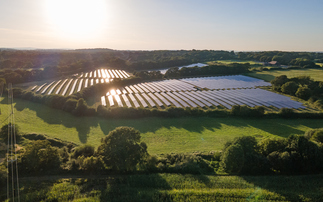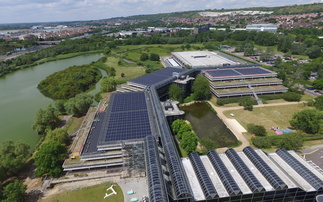Defra's plans to reduce CAP payments for farmers installing solar arrays raise more questions than answers
Environment Secretary Liz Truss this week announced new plans to tackle the "blight on the landscape" that is solar farms, confirming that farmers that install solar arrays will not be able to claim CAP payments for that land.
Truss said the move would save £2m and tackle the "big problem" of "using land that can be used to grow crops, fruit and vegetables" to generate clean energy. But critics yesterday slammed the proposals as a politically motivated attack on a technology that commands around 80 per cent public support, arguing that the move to halt CAP payments would have a negligible impact and had not been fully thought through.
Sources also warned that the new policy raised a host of questions that Defra is yet to answer. BusinessGreen poses seven unanswered questions that arise from Truss' latest bout of anti-solar rhetoric:
1. What evidence is there that the public shares your view that solar farms are "ugly" and a "blight on the landscape", particularly in the light of surveys showing around 80 per cent of the public are supportive of solar technologies?
Survey after survey has shown that solar is the most popular energy source in the UK and there is little solid evidence to show that rural communities are universally opposed to well-located solar farms. Truss has repeatedly complained about the impact of solar farms on the landscape and food production, but has provided little evidence to back up her concerns.
2. Why was a formal consultation not undertaken relating to the changes to CAP rules for farmers installing solar farms?
Policy changes of this nature are often consulted on first, offering all interested parties the chance to put forward their concerns and suggestions. There appears to have only been a short and informal consultation in this case, meaning the solar industry and those farmers who are in favour of diversifying revenue streams by installing renewables on their land have been unable to put forward their case.
3. Why are CAP payments being removed for land where solar farms are co-located with grazing? Does this not address concerns about food security?
Truss implied that her main concern with solar farm development was the potential impact it will have on food production, but once again there is scant evidence to show that solar farms are causing a significant change in food production levels. There are solar farms in the pipeline that could reduce the amount of arable land in production, but Defra's planned blanket withdrawal of CAP payments for solar farm land fails to address two key points: growing numbers of solar farms allow for grazing on the same land; and farmers tend to locate solar farms on their least productive land where possible.
4. How big a boost to UK food production are you expecting as a result of this policy?
As the Green Party's Baroness Jones pointed out yesterday, UK apple production was in decline long before solar farms began to appear. Even if the new policy brought a halt to all solar farm development that impact on food production is unlikely to have any significant impact on supplies or prices.
5. If the main concern with solar farms is that they are taking productive agricultural land out of production why are CAP payments not also being removed for farmland that is not being used to produce food?
This is the key question and highlights the extent to the inconsistency of the government's arguments against solar farms. If the Minister's true concern is the impact of solar farms on food production there are numerous other factors that are having a greater effect on the amount of food the UK produces domestically, ranging from soil erosion and unsustainable farming practices (some of which are still incentivised by the CAP) to the production of energy crops and camp sites.
6. If the main concern is the visual impact of solar farms why are additional CAP changes required on top of planning regulations that already take account of visual impacts?
The landscape impacts of solar farms can be considerable if they are inconsiderately located. That is precisely why the UK has a planning system that allows councils to judge each case on its merits and block developments that would have an unacceptable landscape impact. Consequently, solar farms in plain view or in areas of natural beauty are likely to be refused, while those on marginal agricultural land and hidden behind high hedges are likely to be approved. The reason why the government wants to limit payments for all solar farms on any agricultural land, even that which is well suited to clean energy generation, remains unclear.
7. Do you really expect this policy change to bring a halt to solar farm development?
This is arguably the key unanswered question. Conservative Ministers might be keen on creating the impression that they are bringing a halt to the "blight" of solar farms and refocusing on the solar rooftop industry, but none of the policies announced to date will actually achieve that. The controversial plan to stop solar farms accessing the Renewables Obligation subsidies from next April will make solar farms a less attractive investment, but developers will still be able to compete for the support under the new contract for difference regime, meaning the best projects could still proceed. Meanwhile, projects with less than 5MW of capacity, which still represent a relatively large development, can still access feed-in tariff incentives that far outweigh the CAP income farmers would now have to forgo. Moreover, as the solar industry has repeatedly made plain, the incentives for solar rooftop installations are simply not attractive enough to encourage wide-scale deployment. Farmers and solar firms alike remain sceptical as to whether Truss's announcement will actually deliver the goals she has set.









